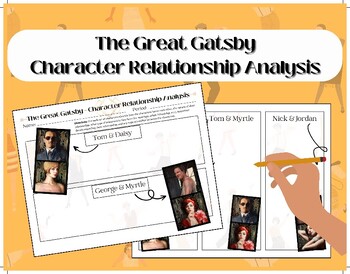Who Inspired Gatsby? Exploring The Real Men Behind The Fictional Character

Table of Contents
F. Scott Fitzgerald's The Great Gatsby immortalized Jay Gatsby, a mysterious millionaire with a captivating past and a tragic fate. But who was the real Gatsby? This article delves into the fascinating question of who inspired this iconic character, exploring the real-life men and experiences that likely contributed to his creation. We'll examine their lives, personalities, and the ways in which they resonate with Gatsby's enigmatic allure, uncovering the fascinating blend of fact and fiction that brought this literary legend to life.
The Influence of Fitzgerald's Own Life and Relationships
The creation of Jay Gatsby wasn't solely a work of imagination; it was deeply rooted in Fitzgerald's own life and experiences. His personal struggles, relationships, and aspirations significantly shaped the character's arc and the novel's themes.
Fitzgerald's Personal Experiences
Fitzgerald's life mirrored Gatsby's in several key aspects. Both men yearned for wealth and social acceptance, chasing the elusive American Dream. Fitzgerald's own struggles with finances and his ambition to achieve a higher social standing are palpable in Gatsby's relentless pursuit of Daisy.
- Financial aspirations: Fitzgerald's early career struggles and his later financial difficulties echo Gatsby's ill-gotten gains and desperate attempts to buy his way into high society.
- Social climbing: Fitzgerald's own attempts to navigate the complexities of the wealthy elite are evident in Gatsby's elaborate parties and desperate attempts to impress Daisy and her social circle.
- Relationships and love: Fitzgerald's tumultuous relationship with his wife, Zelda, cast a long shadow over his writing, influencing the complex dynamics between Gatsby, Daisy, and Tom.
Zelda Fitzgerald's Impact
Zelda Sayre Fitzgerald, a captivating and rebellious woman in her own right, served as a significant inspiration for Daisy Buchanan. Zelda's independent spirit, beauty, and social standing directly influenced Daisy's character and, consequently, Gatsby's obsessive pursuit.
- Zelda's rebellious nature: Zelda's free-spirited attitude and defiance of societal norms are reflected in Daisy's enigmatic personality and her capacity for both love and detachment.
- Roaring Twenties influence: Zelda's embrace of the Roaring Twenties' extravagant lifestyle and social scene is mirrored in the lavish parties and carefree atmosphere depicted in The Great Gatsby.
- Complex relationship dynamics: The complex and sometimes turbulent relationship between F. Scott and Zelda mirrors the fraught romantic entanglements within the novel, informing the emotional landscape of Gatsby's longing and ultimate heartbreak.
Real-Life Figures Who Resemble Gatsby
While Fitzgerald's personal life formed a significant foundation, several real-life figures from the Roaring Twenties also likely contributed to Gatsby's persona.
The Mysterious Millionaires of the Roaring Twenties
The Jazz Age was a period of immense wealth, extravagance, and, for some, shadowy dealings. Many wealthy individuals, often involved in bootlegging and other illicit activities, lived lives of opulent excess, perfectly mirroring the enigmatic Gatsby.
- Bootleggers and gangsters: The era's notorious figures, shrouded in secrecy and known for throwing lavish parties, served as potential inspiration for Gatsby's mysterious wealth. Names like Arnold Rothstein, a powerful gambler and suspected racketeer, frequently surface in discussions about Gatsby's possible real-life counterparts.
- Lavish lifestyles: The extravagant parties and opulent displays of wealth seen in the novel were directly inspired by the lavish lifestyles of the wealthy elite of the time, adding to Gatsby’s captivating image.
Gatsby's Prototypes: The Speculative Candidates
While pinpointing a single "real" Gatsby is impossible, several individuals have been suggested as potential inspirations for specific aspects of his character.
- Max Gerlach: A wealthy acquaintance of Fitzgerald's known for his extravagant parties and rumored involvement in shady dealings.
- Meyer Wolfsheim: A composite character likely inspired by several real-life figures from the underworld of the time.
It's crucial to note that these are merely speculative candidates. Fitzgerald masterfully blended and transformed elements from various sources, creating a character far more compelling than any single individual.
The Blending of Fact and Fiction: Creating Gatsby's Mythos
Fitzgerald's genius lies not in direct imitation, but in the artful blending of fact and fiction. He took inspiration from various sources—his personal life, real-life figures, and the zeitgeist of the era—and molded them into a singular, unforgettable character.
The Transformation of Reality into Art
Fitzgerald’s artistic license is evident in how he synthesized various elements from reality to craft a more nuanced and resonant character. Gatsby is not simply a copy of any single individual; he’s a composite, a culmination of experiences and observations transformed through the author's creative lens.
- Selective appropriation: Fitzgerald strategically borrowed traits, experiences, and anecdotes, transforming them to fit the narrative's needs.
- Symbolic representation: Certain aspects of Gatsby's character, like his relentless pursuit of the American Dream, transcended the specifics of any single person, becoming potent symbols of a wider cultural longing.
Gatsby's Enduring Appeal and its Basis in Reality
Gatsby's enduring appeal stems from the universality of the themes he embodies: the American Dream, the allure of wealth, the complexities of love and loss, and the societal divides of class. The grounding in real-life experiences and individuals makes the story deeply relatable, even a century later.
- Universality of themes: The novel's themes are timeless, continuing to resonate with readers who grapple with similar aspirations, disappointments, and societal pressures.
- Relatability through reality: The subtle echoes of real lives and historical context make Gatsby's story more impactful and emotionally resonant for readers.
Conclusion
Jay Gatsby's enduring appeal stems from his mysterious nature and the intricate blend of real-life inspirations that shaped his character. While no single person perfectly embodies Gatsby, examining the individuals and experiences that inspired Fitzgerald reveals the multifaceted layers of this iconic figure. Understanding these influences provides a deeper appreciation for The Great Gatsby and its enduring resonance.
Call to Action: Intrigued by the real men behind the legend of Jay Gatsby? Continue exploring the fascinating world of F. Scott Fitzgerald and his masterpiece, The Great Gatsby, and uncover further insights into the inspirations behind this iconic character!

Featured Posts
-
 Lids I Barnli Obezbedi A Mesto Vo Premier Ligata
May 13, 2025
Lids I Barnli Obezbedi A Mesto Vo Premier Ligata
May 13, 2025 -
 Serie A Atalanta Vs Lecce Fecha 34 En Directo
May 13, 2025
Serie A Atalanta Vs Lecce Fecha 34 En Directo
May 13, 2025 -
 Analyzing Lara Croft Tomb Raider The Cradle Of Lifes Impact On The Series
May 13, 2025
Analyzing Lara Croft Tomb Raider The Cradle Of Lifes Impact On The Series
May 13, 2025 -
 Authentic Greek Cuisine Arrives In Portola Valley New Taverna Opens
May 13, 2025
Authentic Greek Cuisine Arrives In Portola Valley New Taverna Opens
May 13, 2025 -
 Raptors Lottery Odds Seventh Best Chance At A Top Pick
May 13, 2025
Raptors Lottery Odds Seventh Best Chance At A Top Pick
May 13, 2025
